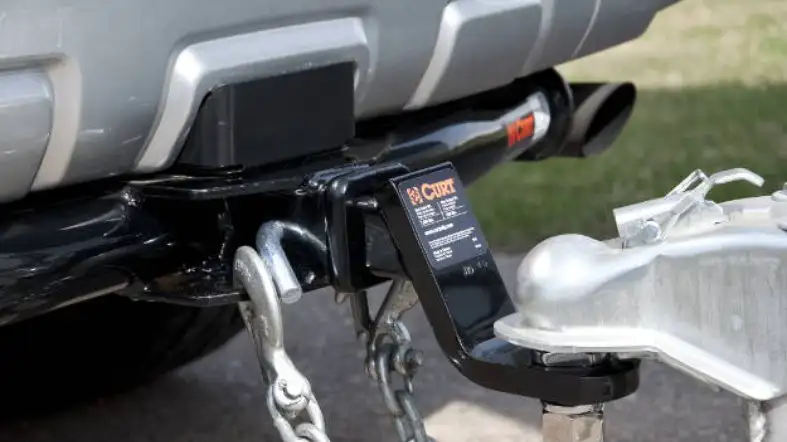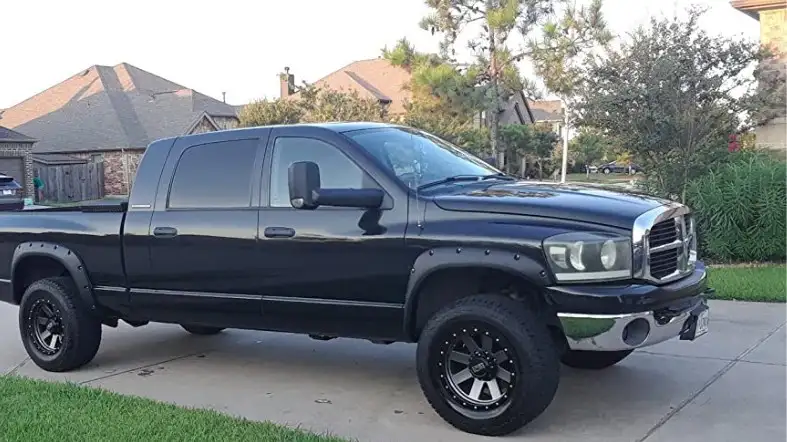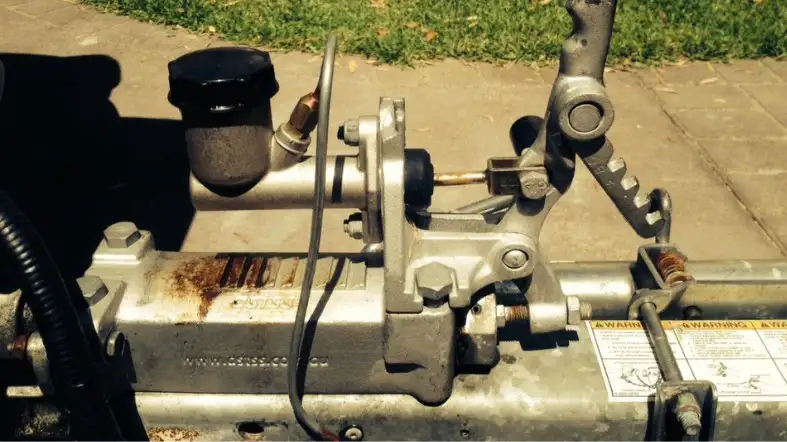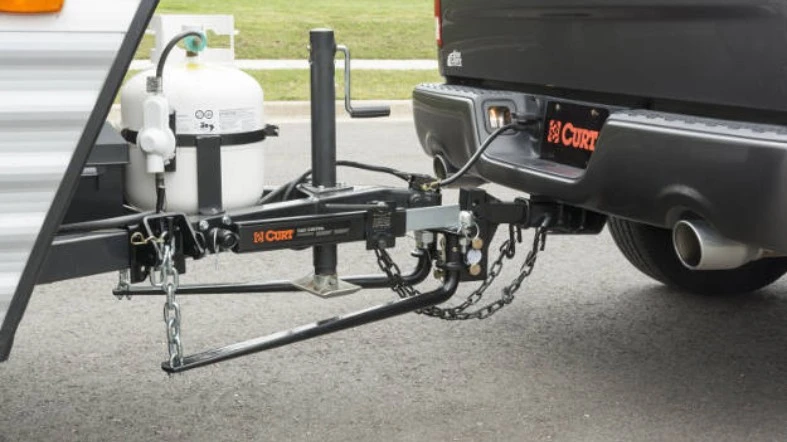Are you planning to tow a trailer with your vehicle?
Whether you’re hauling a small utility trailer or a large recreational trailer, it’s important to make sure you have all the necessary accessories to ensure a safe and successful trip.
In this blog post, we’ll go over the essential items you’ll need to tow a trailer.
By making sure you have all the necessary gear, you can hit the road with confidence and peace of mind.
What accessories do I need to tow a trailer?
Here is a list of accessories you will need to tow a trailer :

Hitch Components
Receiver hitch:
This is the part of the towing system that is mounted to the frame of the towing vehicle.
It consists of a rectangular opening (the receiver) that a hitch ball mount can be inserted into.
There are different classes of receiver hitches available, with each class having a maximum towing capacity.
Hitch ball and ball mount:
The hitch ball is a rounded metal piece that is attached to the hitch ball mount.
The ball mount is a flat, rectangular piece of metal that has the hitch ball attached to one end and fits into the receiver hitch.
The ball mount can be adjusted up or down to level the trailer with the towing vehicle.
Hitch pin and clip or lock:
The hitch pin is a long, cylindrical piece of metal that holds the ball mount in place within the receiver hitch.
The hitch pin is secured in place with a clip or locks to prevent it from coming loose while towing.
Weight-distributing hitch (optional):
A weight-distributing hitch is used to distribute the weight of the trailer more evenly between the towing vehicle and the trailer.
This can help improve the stability and handling of the towing setup, especially when towing a heavy load.
Towing Mirrors:

Extension mirrors or clip-on towing mirrors:
Towing mirrors are extra mirrors that attach to the existing mirrors on your vehicle to give you a wider field of view while towing.
Extension mirrors are long, rectangular pieces of glass that attach to the sides of your vehicle’s mirrors.
Clip-on towing mirrors are smaller mirrors that clip onto the existing mirrors.
Both types of towing mirrors are necessary for increased visibility while towing, as the trailer can obstruct your view of the road behind you.
Trailer Brakes:
Surge brakes:
Surge brakes are a type of hydraulic brake that is activated by the movement of the trailer.
When the trailer slows down or stops, the brake fluid is forced into the brake calipers, causing the brakes to engage.
Surge brakes are self-contained and do not require any additional components on the towing vehicle.
Electric brakes:
Electric brakes are another common type of trailer brake that is activated by an electrical signal from the towing vehicle.
A brake controller, which is a small box mounted in the towing vehicle, sends an electrical signal to the trailer’s brakes when the towing vehicle’s brakes are applied.
Electric brakes offer better braking performance than surge brakes and are a good choice for heavy trailers.
Hydraulic brakes:

Hydraulic brakes are similar to surge brakes in that they use fluid pressure to activate the brakes.
However, they require a separate hydraulic pump and reservoir on the trailer, as well as hoses to connect the pump to the brake calipers.
Hydraulic brakes offer even better braking performance than electric brakes and are often used on large trailers.
Brake controller (required for electric brakes):
A brake controller is a small box that is mounted in the towing vehicle and connects to the trailer’s electric brakes.
It sends an electrical signal to the trailer’s brakes when the towing vehicle’s brakes are applied.
Safety Chains:
Purpose of safety chains:
Safety chains are used to secure the trailer to the towing vehicle in case the hitch fails.
They provide an extra level of security to prevent the trailer from becoming detached from the towing vehicle while in motion.
How to properly attach safety chains:
Safety chains should be attached to the trailer in a crisscross pattern and connected to the towing vehicle’s receiver hitch.
They should be taut, but not too tight, to allow for some movement.
Proper lighting
Here are some requirements for trailer lighting:
Taillights:
All trailers must have taillights that are visible from at least 500 feet to the rear.
These lights should be red and should be lit whenever the trailer is being towed.
Turn signals:
Trailers must have turn signals that are visible from at least 300 feet to the front and rear.
These lights should be amber and should be lit whenever the trailer is being towed and the driver intends to turn.
Brake lights:
Trailers must have brake lights that are visible from at least 300 feet to the rear.
These lights should be red and should be lit whenever the trailer is being towed and the brakes are applied.
Tips To Use Accessories When Towing A Trailer

When towing a trailer, it’s important to use the right accessories to ensure safe and efficient travel.
Here are a few tips to keep in mind:
- Use the correct hitch: Make sure the hitch you are using is rated for the weight of your trailer.
- Use a weight-distributing hitch: A weight-distributing hitch helps distribute the weight of the trailer evenly across the towing vehicle, improving stability and handling.
- Use a sway control device: A sway control device helps prevent the trailer from swaying or fishtailing while driving.
- Use trailer brakes: If your trailer is heavy or has a high center of gravity, it’s a good idea to use trailer brakes to help slow it down.
- Use trailer lights: Make sure the trailer’s lights are functioning properly, and use reflective tape to make it more visible to other drivers.
- Use reflective triangles: It’s a good idea to carry reflective triangles to place behind the trailer if it becomes disabled on the road.
- Use a trailer brake controller: If your trailer has electric brakes, a trailer brake controller can help you control the braking action of the trailer.
- Use a mirror extension: Towing a trailer can block your view of the road behind you. A mirror extension can help you see what’s going on behind you more easily.
By following these tips, you can help ensure a safe and efficient trip when towing a trailer.
FAQs on What Accessories Do I Need To Tow A Trailer
What Type Of Hitch Do I Need To Tow A Trailer?
The type of hitch you need will depend on the weight of your trailer and the towing capacity of your vehicle.
It is important to choose a hitch that is rated to handle the weight of your trailer.
There are different types of hitches available, including weight-carrying hitches, weight-distributing hitches, and gooseneck hitches.
Do I Need A Special Wiring Harness Or Adapter To Tow A Trailer?
It is likely that you will need a wiring harness or adapter to properly connect the lights on your trailer to your vehicle.
The specific type of wiring harness or adapter you need will depend on your vehicle and trailer.
Do I Need To Use Special Tires On My Trailer?
It is generally recommended to use tires that are specifically designed for trailers on your trailer.
These tires are designed to handle the added weight and stresses of towing and may have a higher load carrying capacity than regular passenger vehicle tires.
Should I Carry A Spare Tire For My Trailer?
It is generally a good idea to carry a spare tire for your trailer, as a flat tire can be a major inconvenience.
It can even cause you to be stranded if you are far from home. Having a spare tire will allow you to change the flat tire and get back on the road more quickly.
What Other Accessories Do I Need To Tow A Trailer Safely?
There are a few other accessories that you may need to tow a trailer safely, such as safety chains, a trailer brake controller (if your trailer has brakes), and a trailer jack (to help stabilize the trailer when it is not being towed).
It is also a good idea to have a set of trailer lights and reflectors to ensure that your trailer is visible to other drivers on the road.
Conclusion:
Towing a trailer requires a number of accessories to ensure that it is done safely.
It is important to choose the right accessories and make sure that they are properly installed and maintained to ensure that your trailer is safe to tow.
In addition, it is also important to ensure that your vehicle is capable of safely towing the weight of your trailer and that you follow all applicable laws and regulations when towing a trailer.
Overall, proper preparation and attention to safety are crucial when towing a trailer.
